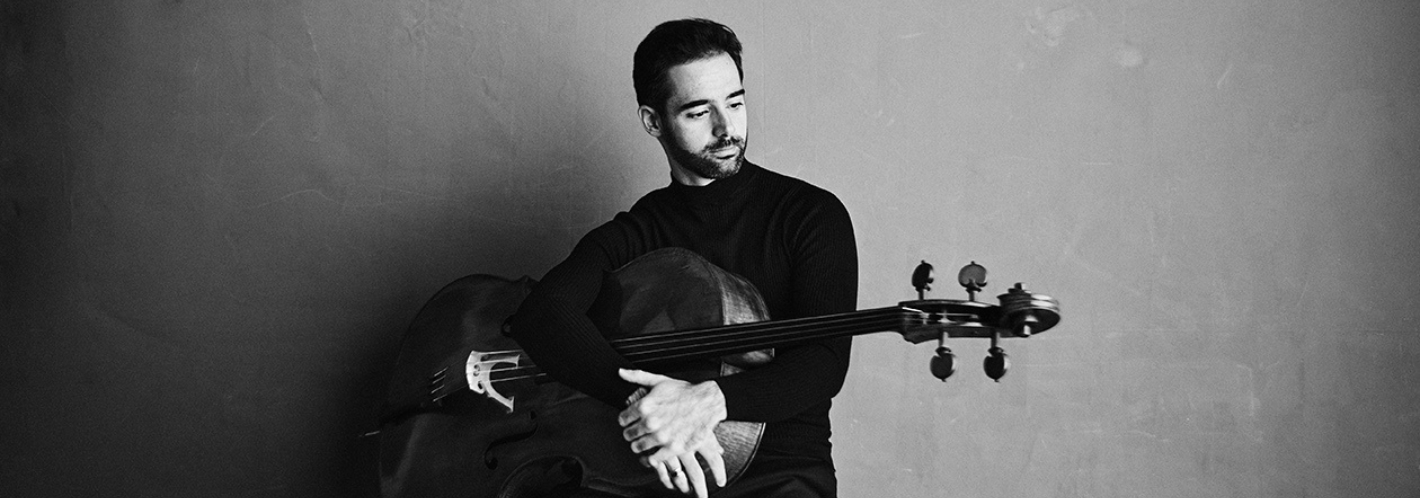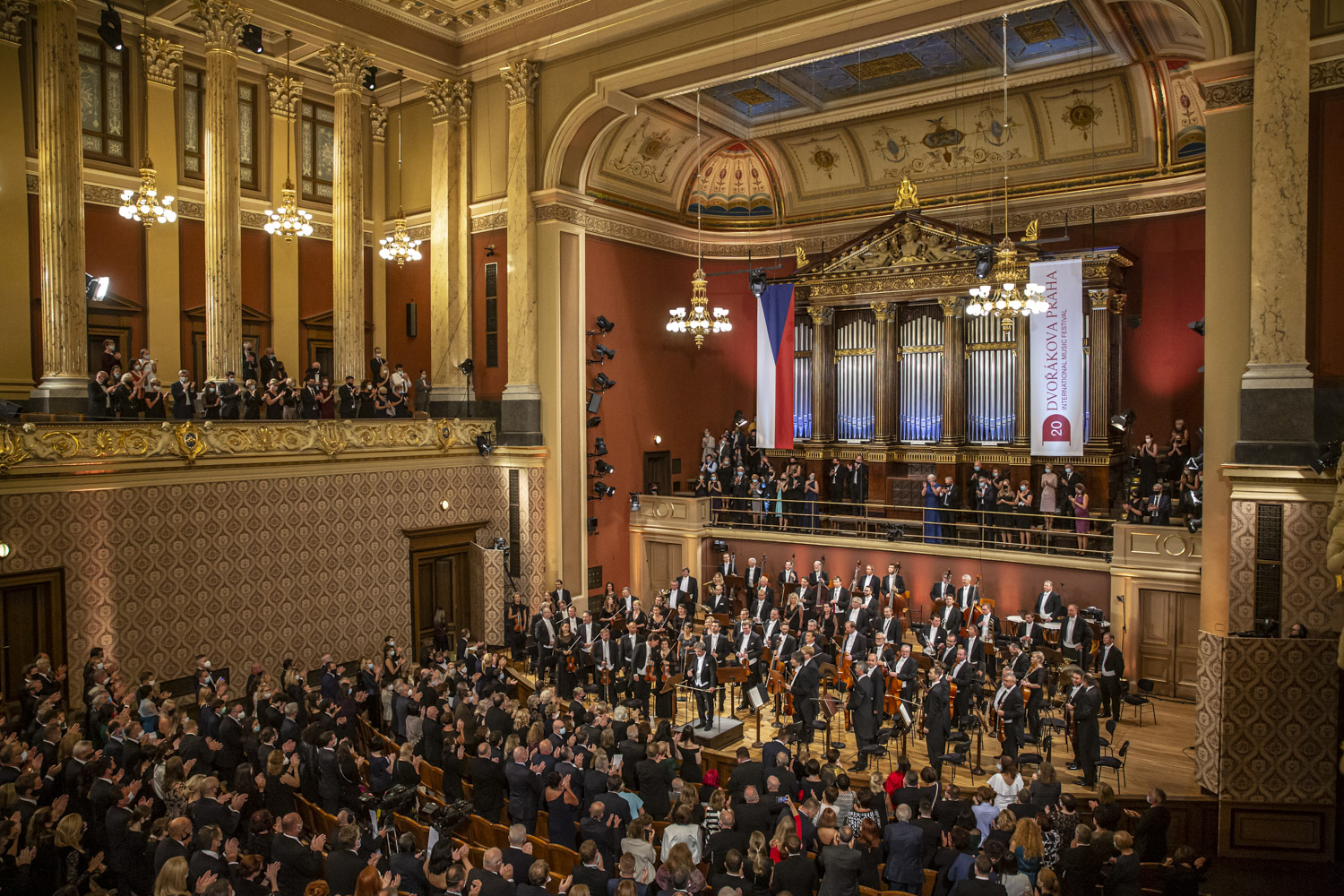
The 15th year of the Dvořák Prague Festival will take place from 8 to 25 September 2022
Antonín Dvořák: Concerto for Violoncello and Orchestra in B Minor, Op. 104, B. 191
Antonín Dvořák: Symphony No. 9 in E Minor, Op. 95, B. 178, ‘From the New World’
Antonín Dvořák’s New World Symphony and Cello Concerto in B Minor mark the beginning and end of his period of employment in the United States. While the earlier composition is brimming with the intoxication of America, its cities, and the music of the country’s African Americans and Native Americans, the later work shows signs of homesickness. The two works have each enchanted the whole world in their own way, and they are among the most popular compositions of all time. Moreover, at the Rudolfinum, where Dvořák conducted the first concert of the Czech Philharmonic, they also gain the stamp of authenticity. While this music has long been circling the globe, performers from around the world come to Prague’s Dvořák Hall to play it where it is truly at home. Dvořák’s two most popular works have become something like a festival fanfare, and performing them will be conductor Myung-Whun Chung with the Munich Philharmonic and the cellist Pablo Ferrández.
Myung-Whun Chung, Ferrández, and the Munich Philharmonic will appear again at the Dvořák Prague Festival the following day in Robert Schumann’s Cello Concerto in A Minor and Anton Bruckner’s Symphony No. 6 in A Major.
The Munich Philharmonic was founded in 1893, and since then, under the direction of renowned conductors, it has vastly enriched Munich’s musical life. Gustav Mahler conducted the orchestra in the world premičres of his 4th and 8th Symphonies, and in November 1911, the world premičre of Mahler’s »Das Lied von der Erde« took place under Bruno Walter’s direction. Ferdinand Löwe led the first Bruckner concerts and established the orchestra’s Bruckner tradition, which was then gloriously continued by Siegmund von Hausegger and Oswald von Kabasta.
During the Rudolf Kempe era the Philharmonic made its first tour to what was then the U.S.S.R. The legendary Bruckner concerts with general music director Sergiu Celibidache made a major contribution to the orchestra’s international reputation. The Munich Philharmonic made Zubin Mehta the first »conductor laureate« in the orchestra’s history. For the 100ths anniversary of the premičre of Gustav Mahler’s Symphony No. 8 in Munich, chief conductor Christian Thielemann conducted two performances of this work. He was succeeded as chief conductor by Lorin Maazel, who held the position until his death in 2014.
As of the 2015-16 season, the position of chief conductor of the Munich Philharmonic is held by Valery Gergiev. Tours have taken the Munich Philharmonic to numerous European cities as well as Japan, China, Korea, Taiwan and the USA. Programme highlights conceived by Valery Gergiev include performances of symphonic cycles by Shostakovich, Stravinsky, Prokofiev and Rachmaninov as well as new formats, such as the »MPHIL 360°« festival. Concerts are regularly broadcast via live stream and on radio and TV. In September 2016, the first CD recordings documenting the Munich Philharmonic’s work were released under the orchestra’s own label, »MPHIL«. From 2017 to 2019, the Munich Philharmonic and Valery Gergiev recorded all of Anton Bruckner’s symphonies in the basilica of St. Florian Monastery, Anton Bruckner's final resting place. The complete recordings have been released in autumn 2020.
With »Spielfeld Klassik«, the Munich Philharmonic has developed a comprehensive music education programme for young and old. Up to 35,000 people of all ages attended the more than 150 events held each year. Under the motto of »MPhil on Site«, the Munich Philharmonic also leaves its home base – the Philharmonie Gasteig – to appear in unusual and varied locations, such as the Hofbräuhaus tavern as well as alpine meadows, clubs and industrial halls.
On 13 October 2018 the Munich Philharmonic and Valery Gergiev celebrated the 125th anniversary of the Munich Philharmonic by performing Igor Strawinsky's »Symphonie de Psaumes« and Gustav Mahler's Symphony No. 8.

Myung-Whun Chung began his musical career as a pianist, winning second prize at the Tchaikovsky Piano Competition in Moscow in 1974. After his musical studies at the Mannes School and Juilliard School in New York, he was appointed Carlo Maria Giulini’s assistant in 1979 at the Los Angeles Philharmonic and became Associate Conductor two years later.
He was Music Director of the Saarbrücken Radio Symphony Orchestra from 1984 to 1990, Principal Guest Conductor of the Teatro Comunale di Firenze from 1987 to 1992 and Music Director of the Opéra de Paris-Bastille from 1989 to 1994. The year 2000 marked his return to Paris as Music Director of the Orchestre Philharmonique de Radio France. His love for Italy has been the basis of his extensive work in that country for many years, including, from 1997 to 2005, his position as Principal Conductor of the Orchestra dell'Accademia Nazionale di Santa Cecilia in Rome. He also appears regularly at the Teatro alla Scala and Teatro La Fenice, recently conducting Madama Butterfly, Simon Boccanegra, Otello and Tristan und Isolde. Other recent opera engagements include La Traviata, Rigoletto and Otello at the Wiener Staatsoper. In Germany, he became Principal Guest Conductor of the Staatskapelle Dresden at the beginning of the 2012/13 season, the first conductor to hold the post in the history of the orchestra. Outside Europe, he is increasingly committed to musical and social causes in Asia through his role as Honorary Conductor Laureate of the Tokyo Philharmonic Orchestra and previously as Music Director of the Seoul Philharmonic Orchestra.
Highlights of the 2021-22 season include a return visit to La Fenice to conduct Fidelio, a European tour with the Wiener Symphoniker and a return visit to the Royal Concertgebouw Orchestra. Myung-Whun Chung will also continue his regular collaborations with the Staatskapelle Dresden, Tokyo Philharmonic Orchestra, Orchestre Philharmonique de Radio France, Orchestra dell'Accademia Nazionale di Santa Cecilia and Filarmonica della Scala.
Myung-Whun Chung has conducted some of the world’s most prestigious orchestras, including the Berliner Philharmoniker, Bayerischer Rundfunk and the Wiener Philharmoniker, as well as all the major London and Parisian orchestras. In the USA, he has collaborated with the Metropolitan Opera, New York Philharmonic, Philadelphia Orchestra, Boston Symphony, Chicago Symphony and Cleveland Orchestra.
An exclusive recording artist for Deutsche Grammophon since 1990, many of his numerous recordings have won international prizes and awards. Recent releases include a solo piano album of Brahms, Beethoven and Haydn, Messiaen Turangalîla Symphony and Shostakovich Lady Macbeth of Mtsensk with the Orchestre de l'Opéra Bastille, as well as Mahler Symphony No. 2, Mahler Symphony No. 9, Tchaikovsky Symphony No. 6 Pathetique and a Beethoven disc, all with the Seoul Philharmonic Orchestra.
Myung-Whun Chung has been the recipient of many honours and prizes for his artistic work, including the Premio Abbiati and the Arturo Toscanini prize in Italy and the Légion d’Honneur (1992) in France. In 1991, the Association of French Theatres and Music Critics named him Artist of the Year and in 1995 he won the Victoire de la Musique prize three times. He was named a Commandeur dans l'ordre des Arts et des Lettres by the French government in 2011. In 2017, he was appointed as “Commendatore dell’Ordine della Stella d’Italia.
Deeply sensitive to humanitarian and ecological problems of our age, Myung-Whun Chung has devoted an important part of his life to these causes. In 1994, he launched a series of musical and environmental projects in Korea for youth. He served as Ambassador for the Drug Control Program at the United Nations (UNDCP); in 1995, he was named Man of the year by UNESCO and Most Distinguished Personality by the Korean press association. In 1996, he received the Kumkuan, the highest cultural award of the Korean government for his contribution to Korean musical life. Myung-Whun Chung now serves as Honorary Cultural Ambassador for Korea, the first in the Korean government’s history. In 2008, he was designated the first conductor named as Goodwill Ambassador for the United Nations Children’s Fund (UNICEF).
Source: Askonas Holt

“Pop-idol magnetism, superb technique and exhilarating musicality reveal a sure star” – LA Times
“With Pablo Ferrández, Spain offers a new cello genius” – Le Figaro
“This soloist belongs to the elite of current internaGonal cellists and seems desGned to follow in the footsteps of another illustrious Spanish cellist named Pablo, Pablo Casals.” - Resonances Lyriques
Prizewinner at the XV International Tchaikovsky Competition and SONY Classical exclusive artist, Pablo Ferrández is hailed as a “new cello genius” (Le Figaro). A captivating performer, “Ferrández has the lot: technique, mettle, spirit, authority as a soloist, expressivity and charm” (El Pais).
Introduced by the Pittsburgh Symphony as “the next Yo-Yo Ma”, Pablo Ferrández has turned into a cello phenomenon and one of the most in-demand instrumentalists of his generation.
His debut album under SONY Classical, “Reflections”, released in 2021, was highly acclaimed by the critics and praised with the Opus Klassik Award. In Fall 2022 Pablo Ferrández released his second album, which comprised the Brahms Double Concerto, performed with Anne-Sophie Mutter, the Czech Philharmonic under M. Honeck, as well as Clara Schumann’s Piano Trio, performed with Ms. Mutter and Lambert Orkis, also receiving rave reviews.
Pablo’s recent seasons have seen him appearing with the Boston Symphony, Cleveland Orchestra, Los Angeles Philharmonic, San Francisco Symphony, Pittsburgh Symphony, Filarmonica della Scala, Orchestra dell'Accademia Nazionale di Santa Cecilia, Tonhalle Orchestra, Bayersichen Rundfunk Symphony Orchestra, Munich Philharmonic, HR-Sinfonieorchester, Konzerthaus Berlin Orchestra, NDR Elbphiharmonie Orchestra, Rotterdam Philharmonic, Royal Philharmonic, Orchestra National de France, Israel Philharmonic, Oslo Philharmonic and Seoul Philharmonic. He has also toured with the London Philharmonic, Academy of St. Martin in the Fields, Antwerp Symphony and the Czech Philharmonic under S. Bychkov.
Ferrández is frequently invited to international renown festivals such as Verbier, Salzburg, Dresden, Sion, Tsinandali, Abu Dhabi and Dvorak Prague Festival, among others.
The 24/25 season brings the returns to Munich Philharmonic, Bamberg Symphony, Orchestra Sinfonica Nazionale della RAI, London Philharmonic, Spanish National Orchestra, KBS Symphony, and Orchestre Philharmonique de Monte-Carlo, where he will play Brahms Double Concerto alongside Anne-Sofie Mutter & K. Yamada. Pablo will also debut in that season with NDR Radiophilharmonie Orchester, Belgian National Orchestra, Bergen Philharmonic, Swedish Chamber Orchestra, North Carolina Orchestra and will be Artist-in-Residence at the Tongyeong International Music Festival in S. Korea.
Additionally, Ferrández will tour with the Royal Liverpool Philharmonic, Borusan Philharmonic, and with the WDR Sinfonieorchester under A. Orozco-Estrada in Spain.
Pablo will appear in trio alongside Anne-Sofie Mutter and Martha Argerich at Hamburg Elbphilharmonie, with Ms. Mutter and Yefim Bronfman on tour in the United States, with Janine Jansen and Denis Kozhukhin at Vienna Musikverien and Kamermuziek Festival Utrecht, and as recitalist in New York, Baltimore, Milan, Florence, Bilbao, Laufen, Munster, as well in the Aix-en-Provence, Sion, Peralada, Verbier and Abu Dhabi Festivals.
Mr. Ferrández plays the Stradivarius “Archinto” 1689, on a generous life-long loan from a member of the Stretton Society.
source: CAMI Music LLC worldwide

The Rudolfinum is one of the most important Neo-Renaissance edifices in the Czech Republic. In its conception as a multi-purpose cultural centre it was quite unique in Europe at the time of its construction. Based on a joint design by two outstanding Czech architects, Josef Zítek and Josef Schultz, a magnificent building was erected serving for concerts, as a gallery, and as a museum. The grand opening on 7 February 1885 was attended by Crown Prince Rudolph of Austria, in whose honour the structure was named. In 1896 the very first concert of the Czech Philharmonic Orchestra took place in the Rudolfinum's main concert hall, under the baton of the composer Antonín Dvořák whose name was later bestowed on the hall.
